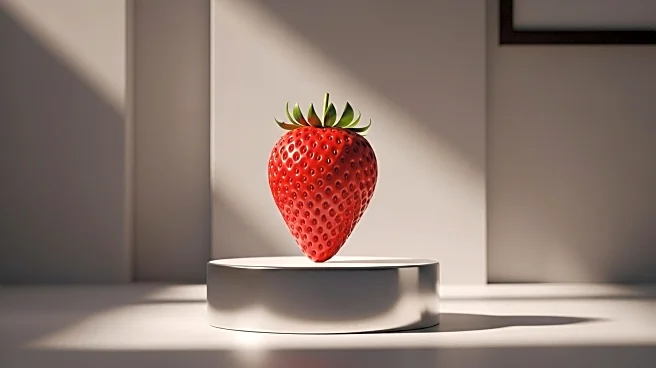What's Happening?
Oishii, an indoor vertical strawberry farm known for its Omakase and Koyo berries, is expanding its brand through various collaborations. Recently, Oishii launched a $22 Oishii Berry Jam whitening toothpaste with Cocolab, following previous partnerships with Apothékary and Iota. These collaborations aim to reach consumers beyond traditional grocery stores, as stated by Oishii's chief commercial officer, Rita Hudetz. The brand operates two indoor farms in New Jersey and is available in over 280 retail locations, including Whole Foods. Oishii's strawberries are grown using vertical farming technologies to replicate Japanese growing conditions, ensuring year-round production. The brand's growth rate has doubled in 2025 compared to the previous year, with Google searches increasing by 44% year-over-year.
Why It's Important?
Oishii's strategic collaborations highlight a growing consumer trend towards premium, clean produce, as people become more aware of the health implications of hyper-processed foods. By partnering with brands across different sectors, Oishii is tapping into the food-beauty crossover market, which has seen success with products like Chipotle-inspired lip stains. This approach not only enhances Oishii's visibility but also aligns with current beauty trends, such as 'strawberry girl makeup.' The brand's expansion into new markets and product lines could significantly impact its market share and consumer base, potentially setting a precedent for other produce brands to follow.
What's Next?
Oishii plans to expand its retail presence in the Midwest and introduce new strawberry varietals. The brand is also exploring further collaborations in beauty products, such as lip gloss, nail polish, and candles. These initiatives aim to capitalize on the popularity of strawberry-inspired beauty trends and food-beauty crossovers, potentially leading to increased consumer engagement and brand loyalty.
Beyond the Headlines
Oishii's innovative approach to farming and marketing may influence broader agricultural practices, particularly in urban environments where vertical farming can optimize space and resources. The brand's success could encourage more companies to explore sustainable farming methods and cross-industry collaborations, fostering a shift towards environmentally friendly and health-conscious consumer products.









